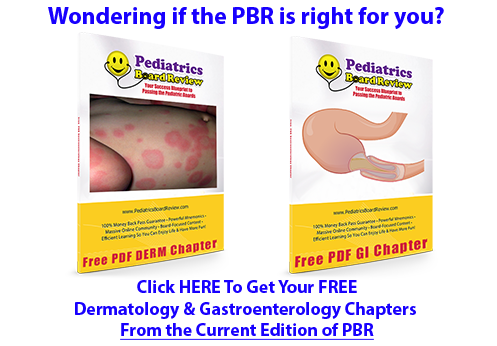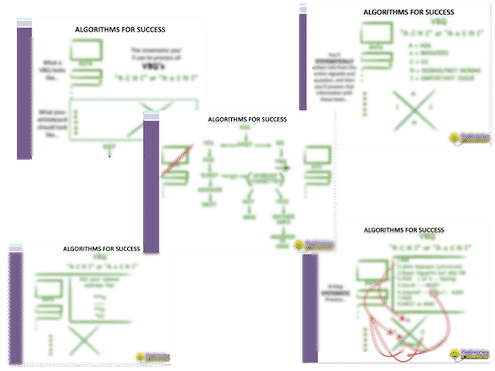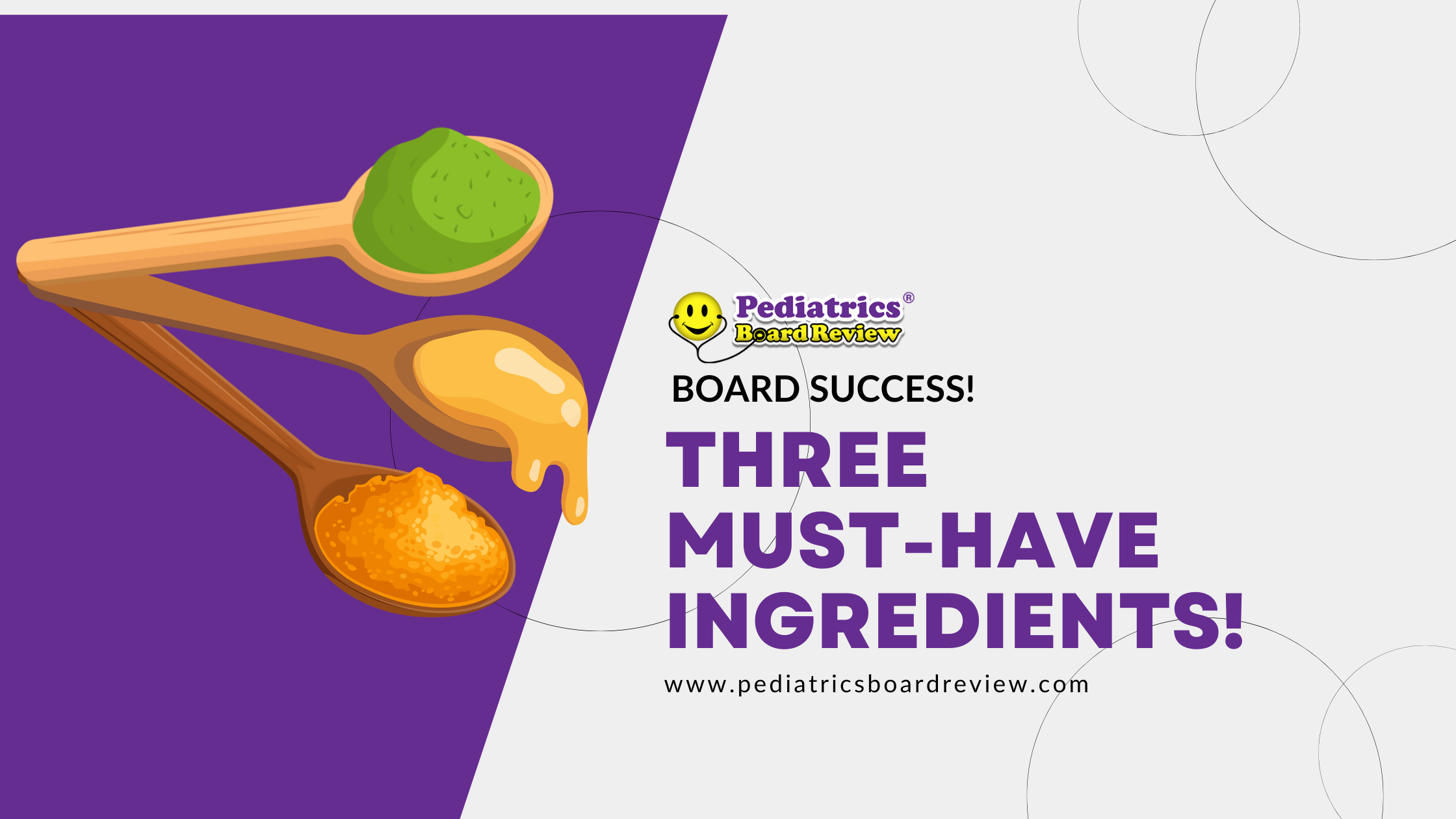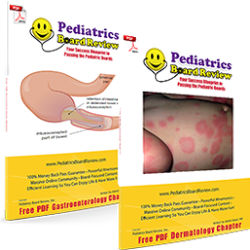Passing the Pediatric Boards – The 3 MUST HAVE Ingredients
Achieving success and passing the pediatric boards is difficult. But, with the right tools and efforts, it's attainable. In this article, I'll introduce you to the 3 main areas you must focus on to pass the boards. Without extensive studying, even a good pediatrician is at high risk of failing the boards.
By the time you finish this article, you'll have a clearer understanding of the overall framework you'll need to direct your efforts towards, and I think you'll find it quite liberating!
Let's start with a few stories…
After the pediatric board results come out, I survey PBR members for feedback (“How was it for you?”). Responses vary widely, but some emotions consistently emerge.
RELIEF
 “Thank you for your support in my board review journey. The PBR audio were so helpful as I would listen to them during my long commute to work. I was able to go over the entire book twice including the online ATLAS. I am now relieved!!”
“Thank you for your support in my board review journey. The PBR audio were so helpful as I would listen to them during my long commute to work. I was able to go over the entire book twice including the online ATLAS. I am now relieved!!”
-Dr. Olivia Simo
CELEBRATION
 ” My score jumped 30 points on this second attempt, which shows that both the test-taking course I attended, and the PBR materials helped me achieve this success. My family knew I could do it this time and everyone is super happy that this hurdle is crossed over! “
” My score jumped 30 points on this second attempt, which shows that both the test-taking course I attended, and the PBR materials helped me achieve this success. My family knew I could do it this time and everyone is super happy that this hurdle is crossed over! “
-Dr. Dixi Patel
GRATITUDE
 ” I have consistently struggled with standardized tests and PBR was by far the best program I have taken. Have the two 90 day schedules of what to study daily gave realistic but attainable goals. More importantly the test strategy is what helped the most to focus on. I am truly grateful for the access to group study and scheduling help I received! “
” I have consistently struggled with standardized tests and PBR was by far the best program I have taken. Have the two 90 day schedules of what to study daily gave realistic but attainable goals. More importantly the test strategy is what helped the most to focus on. I am truly grateful for the access to group study and scheduling help I received! “
-Dr. Christiana Dorsey
———————————-
 “PBR was a great resource while I was studying for the Pediatric board exam. Along with question banks, I felt like it was the ideal supplementation to review the material and learn new information. I thank Ashish and the entire PBR team for putting together such an amazing study guide! “
“PBR was a great resource while I was studying for the Pediatric board exam. Along with question banks, I felt like it was the ideal supplementation to review the material and learn new information. I thank Ashish and the entire PBR team for putting together such an amazing study guide! “
-Dr. Wendy Tamayo
And what do I learn from this feedback?
- I learn exactly what it takes to pass a medical board exam.
- I learn how to help PBR members maximize their efforts and results.
- I learn time and time again that I love my job!
WHAT SHOULD YOU LEARN FROM THESE STORIES
Nobody said that passing the pediatric boards was easy. Pediatricians who turn to PBR often have a history of failing at least one medical board exam. What I’ve learned through my own failed pediatric board exam experience, and from the experiences of hundreds of pediatricians, is that there are three main areas of focus that you must conquer to pass the exam. Below, I'm going to introduce these concepts to you. In separate PBR articles, I expand on each of the concepts and give you more details and concrete strategies to conquer them.
CONTENT TECHNIQUE COMMITMENT

#1 – CONTENT
“CONTENT” simply refers to the pediatric knowledge base you need to secure for the upcoming boards. While most of us feel comfortable surrounded by tons of high-quality, high-cost materials, more is not better for this exam. In fact, when it comes to pediatric boards, having too many resources has proven time and time again to be a recipe for disaster (aka a FAIL!)
The truth is, you should focus on ONE TRUSTED, PRIMARY STUDY RESOURCE that you get to know inside and out.

PBR members have done just that. They choose to focus on the PBR materials and learn the information deeply through multimodal resources. To avoid “information overwhelm,” the resources are created in a “congruent” manner, meaning the digital resources (i.e., the audio course, the video course, the order of images presented in the Virtual Atlas of Pediatric Pictures, etc.) all flow in the exact same order and avoid introducing new and esoteric information. This means you can use your books as a syllabus while you listen to the audio course or watch the video course.
The results are OUTSTANDING!
Here’s what just a few of those who passed have had to say about concentrating on the PBR materials exclusively…
 “The PBR study guide and program allowed me to focus on the most important content to study in preparing for the exam.”
“The PBR study guide and program allowed me to focus on the most important content to study in preparing for the exam.”
-Dr. Michael Gasser
———————————-

-Dr. Jose Texidor
QUICK TIP: Of the 3 key ingredients, the CONTENT is the most important. Surprisingly, it's also usually the easiest one to fix. This single change in strategy (i.e., focusing on one, trusted resources to avoid “information overwhelm”) has helped thousands of pediatricians pass their pediatric boards. So, once you have a trusted resource in hand, you MUST resist the urge to look at anything else.
FREE STRATEGIES
#2 – TEST-TAKING STRATEGY
“TEST-TAKING STRATEGY” refers to having a strategic approach to everything related to board preparation. This includes how to systematically process board-style questions and how to prepare for the boards in a high-quality way for that maximizes performance and reduces anxiety.
Of the 3 ingredients, it's the hardest to tackle. Learning how to process board-style questions is easy with PBR's test-taking strategy resources, but becoming an “elite studier” who can prepare day after day in a high quality way can be a tremendous challenge.
When it comes to actually taking standardized exams, test-taking strategy comes naturally to some physicians. But, for those who struggle, there's usually something “broken” in their approach to answering board-style questions. This concept of being skilled at answering board-style questions is so foreign to some people that I've written an article focusing on 3 test-taking strategies you can implement immediately to increase your board scores today to demonstrate techniques that can instantly shift your perspective on how to approach board-style questions.
In particular, I've noticed that pediatricians who did not attend a U.S. medical school (i.e., International Medical Graduates) especially struggle with the American Board of Pediatrics (ABP) initial certification exam. Even if they have a great handle on the CONTENT, they struggle with board-style questions because the style is foreign to them. Some had essay-based exams in medical school and others had oral examination.
For U.S.-trained physicians, the skill of approaching, evaluating, and processing board-style questions has simply never been cultivated and practiced. Instead, many of us treat questions like they are are living, breathing, miniature patients. But, they're not.
For example, have you ever spent 2 or 3 minutes on a test question even though you know that you're only supposed to spend 75 seconds? Every other question on the exam is worth the exact same point value as that one. So, why do you do it? It's because you want to prove that you can fix that patient.
Guess what? I've done that too! Sadly, it resulted in me missing out on 5-7 EASY questions on the initial certification exam that were hidden at the very end of an exam bock.

I hope you're starting to get an idea of what I mean by TEST-TAKING STRATEGY. If you are someone who has failed a medical board exam, you must find help. You need an experienced test prep coach to help you figure out what is “broken” in your approach so that it can be fixed through a structured, systematic method. Only once that's done should you then go through hundreds of board-style questions for practice and reinforcement of your test-taking strategy.
Unfortunately, test prep coaches are really hard to find, or they teach outdated techniques that are not appropriate for the pediatric boards. That's where PBR's Test-Taking Strategies and Coaching courses comes in.
See for yourself how our students feel about the influence of the test-taking strategies that they've learned from PBR's coaching courses…
 “… I also wanted to specifically highlight the Test-taking strategies webinar which was one of the best resources I could have attended.”
“… I also wanted to specifically highlight the Test-taking strategies webinar which was one of the best resources I could have attended.”
-Dr. Anahi Huang
———————————-
 “The course helped me focus on “the ask”. I realized that I was distractible before and will answer what I think is being asked rather than what the question wants.”
“The course helped me focus on “the ask”. I realized that I was distractible before and will answer what I think is being asked rather than what the question wants.”
-Dr. Stella Hartono
———————————-
 “When I saw the result I was crying for about 1 hour with disbelief that I passed the exam. The VIP bundle plus live deep test taking techniques helped me to reach my goal.”
“When I saw the result I was crying for about 1 hour with disbelief that I passed the exam. The VIP bundle plus live deep test taking techniques helped me to reach my goal.”
-Dr. Paola Polanco
So, if you think that you've ever had a TEST-TAKING STRATEGY problem on board exams, the PBR's test-taking strategy and coaching courses will make all the difference in the world. And if you want to read about the 3 great test-taking strategies you can start to implement TODAY, just click here.

#3 – COMMITMENT
“COMMITMENT” refers to your drive and ability to do everything needed to secure the CONTENT and the TEST-TAKING STRATEGIES to pass. The lack of commitment is a VERY common reason that intelligent physicians often fail board exams. It takes a considerable amount of time and effort to become a board-certified pediatrician. For example, even for first time test-takers who are at low risk for failing the pediatric boards, I recommend a minimum of 300 hours of dedicated board preparation. Many pediatricians do not prioritize and set aside that time because they are not committed to process.
Those who fail the boards often know they didn’t put as much effort in as they should.
 “I didn't take the initial Peds Cert Exam seriously, but I finally passed! Thank you, PBR, for the structure, content, and study schedule—it’s a huge relief to have passed!”
“I didn't take the initial Peds Cert Exam seriously, but I finally passed! Thank you, PBR, for the structure, content, and study schedule—it’s a huge relief to have passed!”
-Dr. Olivia Simo (Went on to pass in 2021 using PBR)
The solution is to start early, follow a study plan, use one resource, and stick to it. I go into more details about building out a schedule in another. I also offer ideas on an overall study plan in my article titled “Need a Pediatric Board Study Plan?.” In general, though, you'll need to ask yourself…
- Am I prepared to…
- Study at the right time of the day?
- Study almost EVERY day?
- Prioritize my studies above all else?
- Sacrifice time with my family?
- Sacrifice time at my job?
- Sacrifice earned income with a longer-term goal in mind?
Although a negative response does not necessarily mean failure, you should prepared for such an outcome. Make efforts to set expectations for yourself and to share those expectations with those around you.
But, if you can answer “yes” to all of those questions, you'll be miles ahead of 80%-90% of the pediatricians who fail the boards every year (over 1000!). I’m certain of it.
PASSING THE PEDIATRIC BOARDS
The overwhelming sense of joy and relief you get from passing the pediatric boards is almost immeasurable.
You recapture time with your family, take vacations without the nagging feeling in the back of your head that you should study for the boards, and gain freedom from future repercussions, like returning to pediatric residency training to become board eligible again.
PBR members can probably put it much better than I ever could…
“The PBR book was an excellent resource and my go-to for board prep. I highly recommend it to my friends and colleagues when their time comes for boards!”
-Dr. Zarine Broca
 “I am so grateful PBR created a program so I could have structure and wouldn't do it alone through the tough months leading up to the exam. I can now move on with my life and never have to sit through a 9 hour long exam ever again. I am free! Thank you!“
“I am so grateful PBR created a program so I could have structure and wouldn't do it alone through the tough months leading up to the exam. I can now move on with my life and never have to sit through a 9 hour long exam ever again. I am free! Thank you!“
-Dr. Maria Yoon
And that, in a nutshell, is what passing the pediatric boards will mean to you. You can get your life back. You can move forward, and I guarantee you will never look back.
PBR TOOLS
- PBR: Read about the PBR resources and watch behind the scenes videos from the PBR Members' area: https://www.pediatricsboardreview.com/course
- PBR Test-Taking Strategies and Coaching Resources: Discover PBR's Live Test-Taking Strategies & Deep Study Course to enhance your understanding of effective test-taking strategies and the strategies needed to maximize every minute of your board preparation and exam day experience. By doing this, you will equip yourself to answer questions on any medical board-style examination, and you will learn how to find balance and even a little joy during this board prep season.
Good luck!

Ashish Goyal, MD
CEO, Pediatrics Board Review Inc.
Board Certified Pediatrician
Board Certified Internist
American Board of Pediatrics (ABP) Question Contributor
Author, Pediatrics Board Review Educational Series
Founder of AVSAR, a 501-c-3 nonprofit organization
Web: www.PediatricsBoardReview.com





